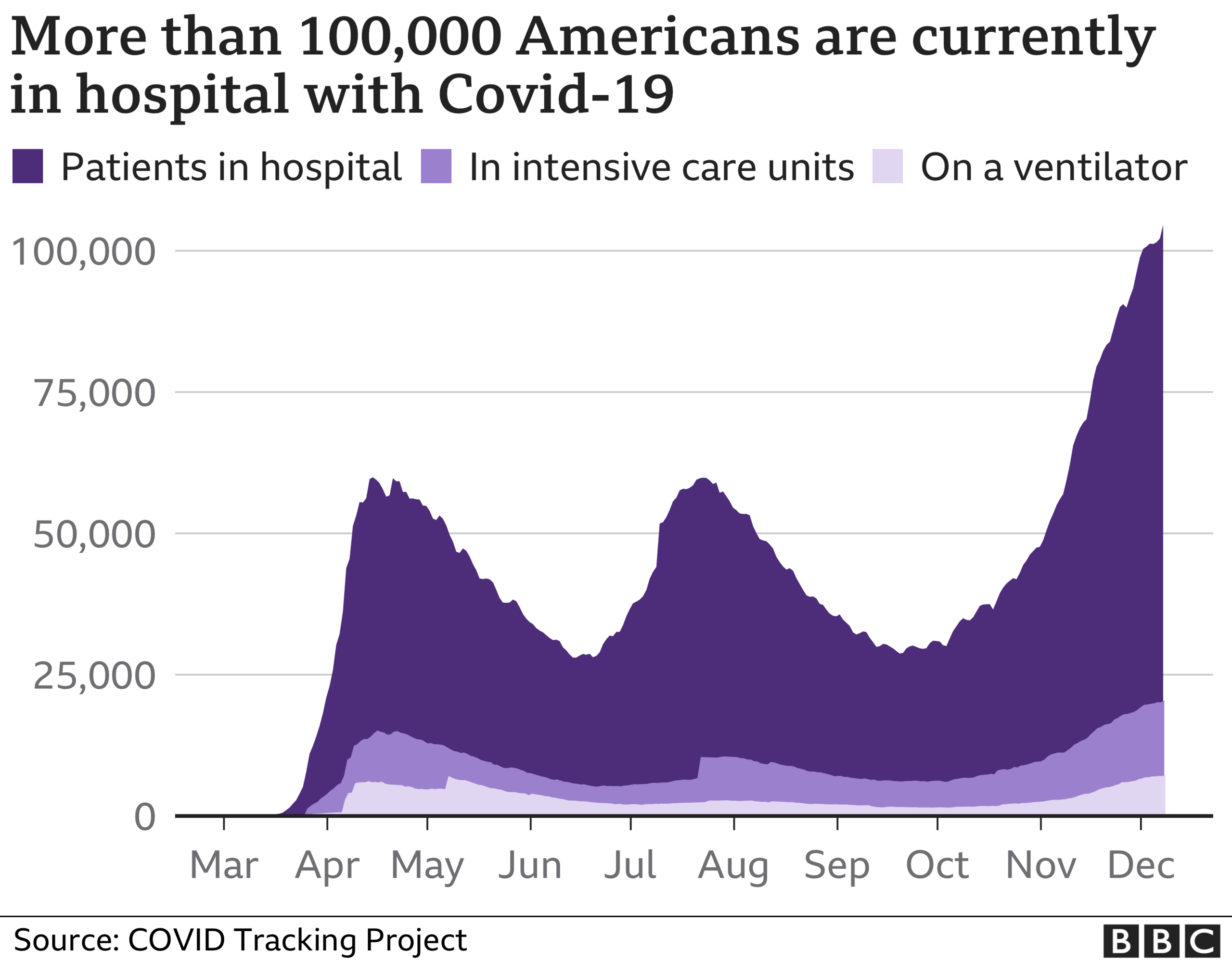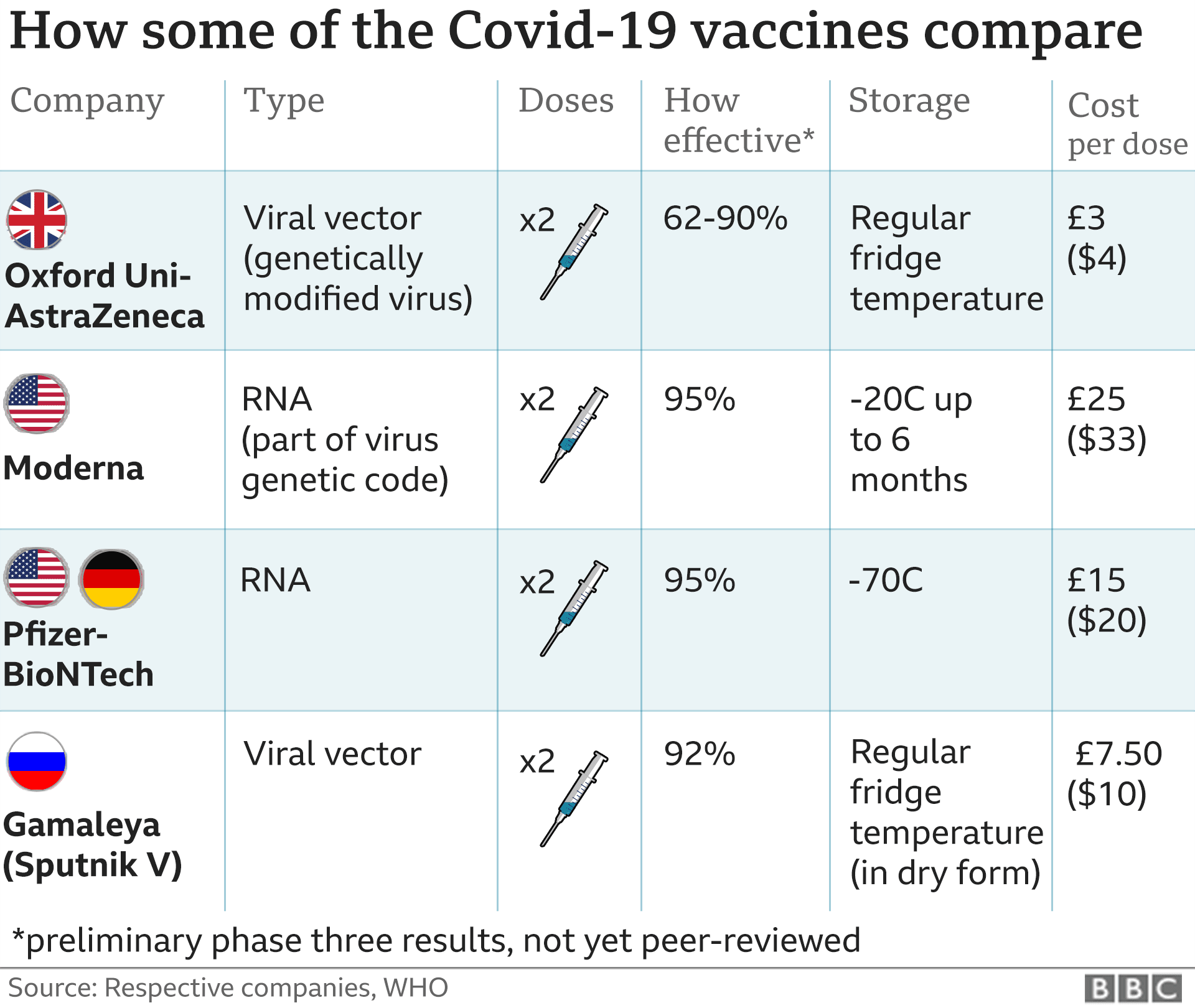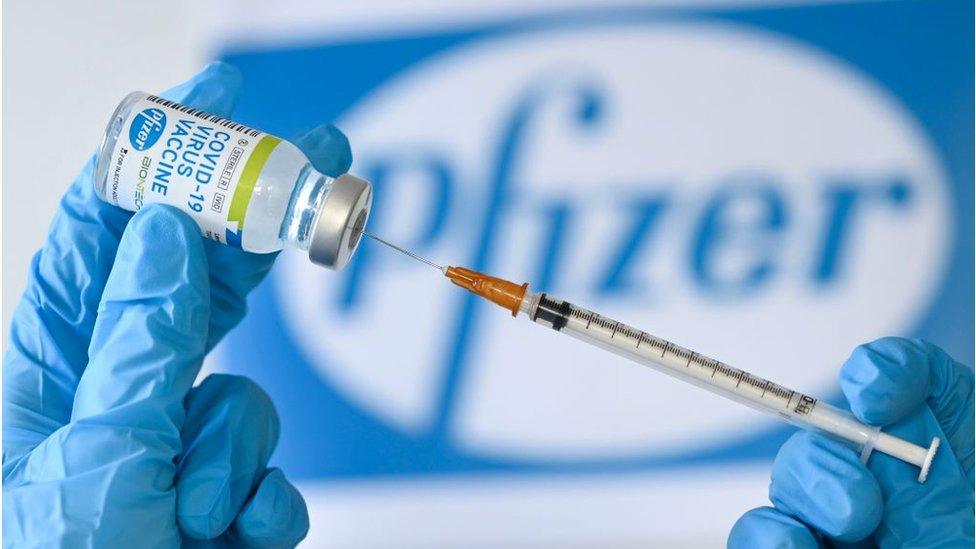Covid: Biden vows 100m vaccinations for US in first 100 days
- Published
"Masking, vaccinations, opening schools": Joe Biden's key goals for his first 100 days
US President-elect Joe Biden has set a goal of 100 million Covid vaccinations in his first 100 days in office.
He said his first months in office would not end the outbreak and gave few details on a rollout plan but he said he would change the course of Covid-19.
Introducing his health team for when he takes office on 20 January, he urged Americans to "mask up for 100 days".
On Tuesday, a report paved the way for a Pfizer/BioNTech vaccine to be approved and rolled out for Americans.
Emergency authorisation for its use could be issued by the Food and Drug Administration (FDA) on Thursday, with the country's top infectious disease expert Dr Anthony Fauci saying mass vaccination could start as soon as next week.
Also on Tuesday, President Donald Trump attended a summit at the White House of his Covid-19 vaccination programme, Operation Warp Speed, and hailed the expected approval of vaccines. His administration hopes to vaccinate as many as 24 million people by mid-January.
The US has recorded more than 15 million cases so far and 285,000 deaths, according to Johns Hopkins University research, external, both global highs.
Many parts of the country are seeing peak infections, with record numbers of people in hospital, with some experts blaming travel by millions over the recent Thanksgiving holiday.
At a news conference on Tuesday, Mr Biden laid out how he plans to address the pandemic in his first 100 days in office. That period is traditionally seen as a benchmark for new presidents to make their mark with new policies and ideas.
He vowed to get "at least 100 million Covid vaccine shots into the arms of the American people".
"My first 100 days won't end the Covid-19 virus. I can't promise that. But we did not get into this mess quickly. We're not going to get out of it quickly," he said at the event in Delaware, giving few details of how the largest vaccination programme in US history would be carried out.
One travel nurse's journey to US Covid hotspots
Last week, Mr Biden complained he had been given no rollout plans by the Trump administration. Operation Warp Speed's top scientist Moncef Slaoui has still to meet the Biden team and is expected to do so this week.
Getting children back to school would also be a priority, the president-elect said.
Mr Biden also introduced California Attorney General Xavier Becerra as his nomination for health secretary and his choice of Rochelle Walensky as head of the Centers for Disease Control and Prevention (CDC).
Among his other aides will be Dr Anthony Fauci as chief Covid medical adviser. The expert also advised the Trump team and often fell foul of the president for his views.

Can 100 million people be vaccinated in 100 days?
Getting 100 million vaccines to Americans in just over three months is not expected to be easy. The large geographical size of the US and the logistics of rolling out a new vaccine could present challenges in achieving the goal.
Helen Branswell, senior writer on global health at US-based website Stat News, has described Mr Biden's plan as "potentially realistic" if the supplies of the drug are available and Mr Trump successfully begins the vaccination programme before his term ends.
"I think the early part of the vaccine delivery programme is going to be very bumpy in the US so by the time he [Mr Biden] takes office some of those bumps may have been levelled out a bit," Ms Branswell told the BBC.
Five challenges of distributing a Covid-19 vaccine around the world
Dr Fauci suggested the plan was "bold but doable", warning "the road ahead will not be easy".
By comparison, 51.8% of Americans older than six months were vaccinated against flu in 2019-20, according to the CDC, external. The US population is 316 million people, which means that around 158 million people were given flu jabs between July 2019 and May 2020.
In the UK, the government says it aims to vaccinate 800,000 people over the next few weeks after it began the world's first approved rollout of the vaccine.
What has Trump said?
The event was mainly a celebration of Operation Warp Speed's efforts to get a vaccine to the American people. President Trump said of the expected vaccine approvals: "They say it's somewhat of a miracle and I think that's true."
He added: "Every American who wants the vaccine will be able to get the vaccine and we think by spring we're going to be in a position nobody would have believed possible just a few months ago."
Trump: "Every American who wants the Covid vaccine will get it"
The president also signed an executive order aimed at ensuring that Americans had first priority in receiving doses. But it remains unclear how that will affect contracts that US companies have already signed with other countries.
The Trump administration did sign up for an initial 100 million doses of the Pfizer/BioNTech vaccine but a member of the Pfizer board said the chance to buy more was turned down a number of times and more doses might not be available until June.
The Operation Warp Speed team said its policy was to deal with a number of manufacturers of vaccines. US media reported the executive order reflected concern that supplies might not be enough.
Where is the US with vaccinations?
On Tuesday, US regulators confirmed the Pfizer/BioNTech Covid vaccine was 95% effective, paving the way for it to be approved for emergency use. The FDA found no safety concerns to stop approval of the vaccine.
Although two doses are needed to offer full protection, the first jab prevented 89% of the most severe cases. Some side-effects such as redness or swelling at the injection site, short-term fatigue, headaches and muscle-pain were reported but were considered mild.


US biotech firm Moderna has reported similar successes with its vaccine and it is also expected to get FDA approval before Christmas.
Estimates of the cost of both vaccines are in-line with the flu jab, which is about $40 (£30) per person in the US. Mr Trump's government is taking steps to provide the vaccine at no cost to elderly people and those who receive government assistance for healthcare costs, according to the Centers for Medicare & Medicaid Services (CMS)., external
Meanwhile, the coalition People's Vaccine Alliance warned that rich countries were hoarding doses of Covid-19 vaccines and people living in poor countries were set to miss out.

VACCINE: Will we get our old lives back?
EDUCATION: How to be an online student
EASY STEPS: How to keep safe
HOPE AND LOSS: Your coronavirus stories

- Published8 December 2020
